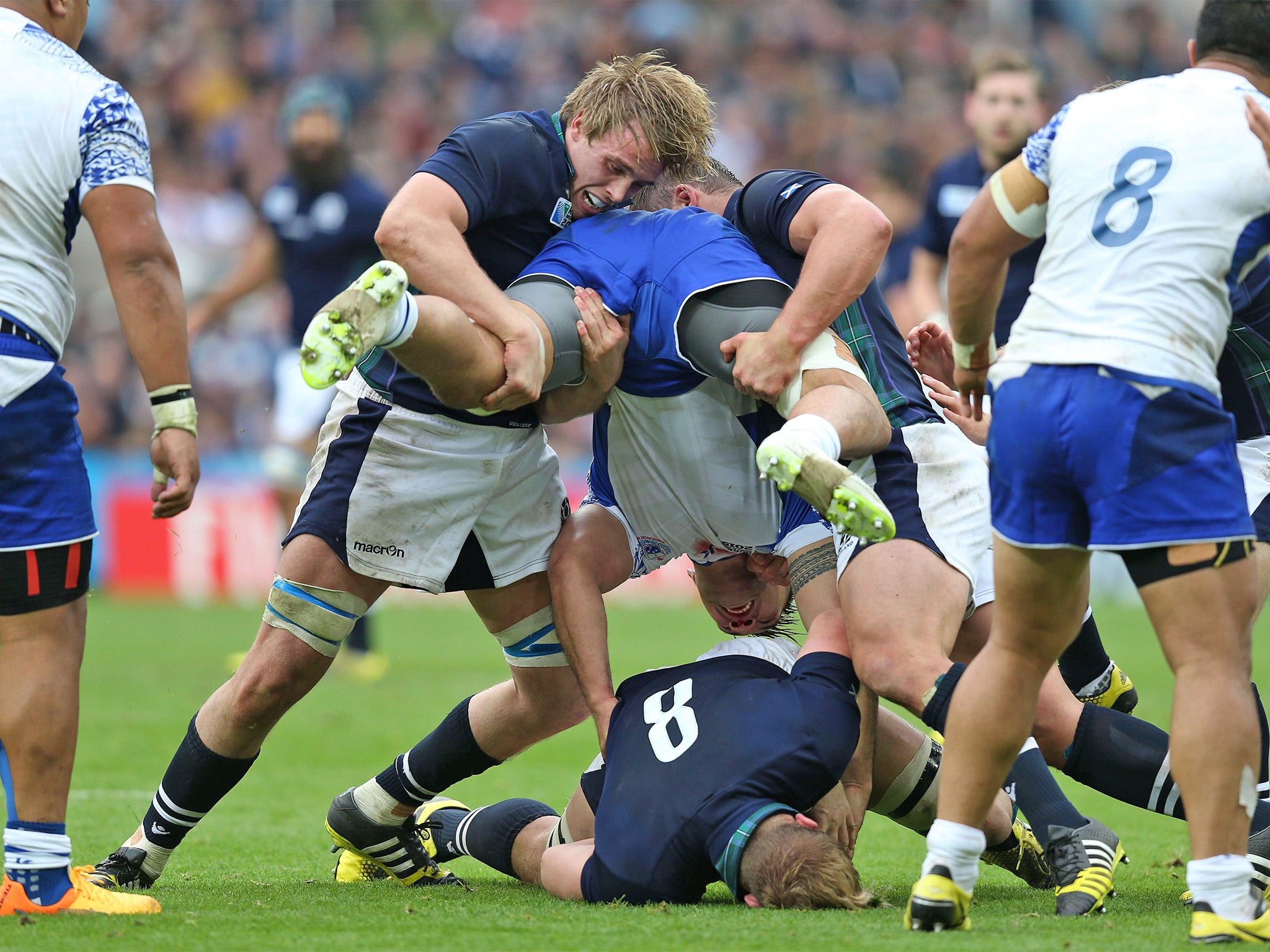RWC 2015: Sympathy for Ross Ford and Jonny Gray as Scots consider appealing against bans
The pair were cited for dangerous tackling in the match against Samoa

The Scotland head coach, Vern Cotter, and fellow members of the World Cup quarter-finalists’ management are sifting through a 16-page, 7,241-word disciplinary judgement against the hooker Ross Ford and the lock Jonny Gray before deciding whether to launch an appeal against the three-week bans that have ended the players’ interest in the tournament. A final call will be made on Thursday.
Ford, the most experienced forward in the party, and Gray, widely considered to be the most gifted, were cited for dangerous tackling – a double “clear-out” at a breakdown on the Samoan flanker Jack Lam during last Saturday’s final pool game in Newcastle – and subsequently found guilty by the independent judicial officer Christopher Quinlan QC. In the absence of a successful appeal, both men will miss the quarter-final with Australia at Twickenham on Sunday and, indeed, any other game their country might play in this competition.
There have been accusations of heavy-handedness from all corners of the rugby landscape: even Michael Cheika, the Wallaby coach, said he felt sorry for Ford and Gray, although he went on to admit that he had not seen footage of the incident. There were also claims of inconsistency within the judicial process.
“It’s not the worst case in the world,” argued the former Scotland and Lions prop Peter Wright, who sits on his own governing body’s disciplinary panel. “Common sense doesn’t come into it, unfortunately, and there doesn’t seem to be consistency across the board. When you compare it to the Sean O’Brien case [the Ireland flanker is serving a one-week ban for punching the French lock Pascal Papé] it does look a bit unfair.”
Two back-row forwards who play alongside Ford and Gray in the Scotland pack, Josh Strauss and David Denton, were keen to make supportive noises, even though there were tight restrictions on what they were able to say. “When I heard about it I was angry for them,” Strauss said. “I imagined myself in their shoes, imagined what it would be like if it was me. I suppose the good thing is that I’ll bank my thoughts and use them as motivation.”
Denton, meanwhile, confessed that the complex laws surrounding the tackle area and the clearing out of individuals around the ball were making life more than a little challenging for players expected to make instant calls on what they should do to whom, and at what force, in a fluid and dynamic situation.
“It’s difficult,” Denton said. “You’re making split-second decisions that can have ramifications for the next three weeks. Or so it appears. When an opponent’s neck is involved, I guess you have to keep away. If you don’t, someone will kick up a fuss. The trick is to get to the ruck first and be clever about it. Do we feel as though we’re getting the rough end of the stick? It sometimes feels like that, but we have to park it and move on. We can’t sit here feeling sorry for ourselves.”
World Rugby, the sport’s international governing body, made it clear before the tournament that any incident in which a player landed on his head or neck after being tipped “beyond the horizontal” – either in a tackle or a clear-out – would be considered dangerous and dealt with accordingly. Ten years ago, when a couple of All Blacks tipped up the great Ireland centre Brian O’Driscoll and left him nursing a dislocated shoulder, it was allowed to pass without sanction. Now, it is considered a hanging offence.
Lam certainly ended up in an uncomfortable position as a result of the two Scots’ attentions, but there was no question of any premeditated wrongdoing. The lawmakers may one day reach the eminently sensible conclusion that if players were stopped from playing the ball with their hands at the tackle area in favour of driving over it on their feet, the sport would be a whole lot safer. In other words, rugby needs proper rucking.
Join our commenting forum
Join thought-provoking conversations, follow other Independent readers and see their replies
Comments